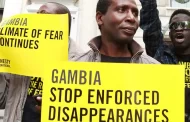Is there any chance that, as various groups and interests coalesce into conversation classes around June 12, they will transcend the experiential and the self-evident towards inferences that tie together the many paradoxes embodied in that date? This must be the popular expectation from memorials over an issue that is ever expanding in significance in Nigerian history, dividing at one point but uniting at the other, almost with equal force.
 June 12 has certainly become the most important case study in the shifting significance that makes critical analysts to deny permanence or stability of meaning to any reality or deny reality outside of contingent interpretation of such. Who today, for example, is the hero or the villain? Is it IBB whose regime produced the June 12 crisis by annulling the election in the first case or Buhari whose own regime reified the late Chief MKO Abiola significance in a national holiday but has, by consensus, left many wondering about his attitude to inclusive governance?
June 12 has certainly become the most important case study in the shifting significance that makes critical analysts to deny permanence or stability of meaning to any reality or deny reality outside of contingent interpretation of such. Who today, for example, is the hero or the villain? Is it IBB whose regime produced the June 12 crisis by annulling the election in the first case or Buhari whose own regime reified the late Chief MKO Abiola significance in a national holiday but has, by consensus, left many wondering about his attitude to inclusive governance?
Is there now a national attitude that takes June 12 as a matter of “what we make of it?” If not, is it being constructed and along which lines?
There is the gist that the problem in Nigeria is not always bad governance as bad as they come but that the response to that is always so ideologically and organizationally scattered to be located on any serious prism as far as the project of national remaking is concerned. Is that about being overcome?
In June 12 lies inestimable potentials. Should one of that be the emergence of a core of clear-eyed, much more ambitious transformative cabal, all the unproductive bickering today will give way to a coherent multi-national state set to take the seat the world has since reserved for it but which it has not been able to take because of instability at home. Perhaps, this is too optimistic but what is left in the absence of optimism?


























